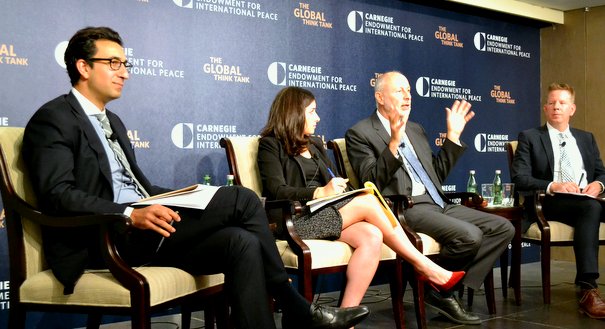Registration
You will receive an email confirming your registration.
What are the short and long-term obstacles to finalizing and sustaining a nuclear deal with Iran, and how would a U.S.-Iran nuclear détente impact ongoing conflicts and long-standing alliances in the Middle East? The Carnegie Endowment for International Peace hosted two panels discussing the nuclear deal and its regional implications.
The Future of the Deal
In this panel, the participants discussed the technical aspects of the framework deal that was signed in the beginning of April.
In this panel, the participants discussed the technical aspects of the framework deal that was signed in the beginning of April. They also talked about the potential for a future deal to be signed in the end of June and what areas the deal will cover, as well as the difficulties to signing the deal and how it would be received by American and Iranian officials.
Participants included Jessica T. Mathews, distinguished fellow and former president of the Carnegie Endowment for International Peace, Ali Vaez, the International Crisis Group's Senior Analyst on Iran, and George Perkovich, vice president for studies at the Carnegie Endowment for International Peace. The panel was moderated by David E. Sanger, chief Washington correspondent of the New York Times.
Ali Vaez
Jessica Tuchman Mathews
Distinguished Fellow
George Perkovich
Japan Chair for a World Without Nuclear Weapons, Vice President for Studies
David E. Sanger
The Regional Implications of the Deal
It remains to be seen whether the Iran nuclear deal will encourage Tehran to pursue a more aggressive foreign policy in the Middle East, with potentially significant regional consequences.
The participants talked about the opportunities and risks the nuclear deal could have for the Arab monarchies of the Gulf as well as the Levant. There is an ongoing debate over whether the Iran nuclear deal will encourage Tehran to pursue a more aggressive foreign policy in the Middle East. The Gulf monarchies are fearful of this prospect and are currently planning to counter against a more aggressive Iran. Any change in Iranian foreign policy will also have a significant impact on the Levant, where Iran supports the Syrian regime and Hezbollah in Lebanon.
Participants included Karim Sadjadpour and Frederic Wehrey, senior associates at the Carnegie Endowment for International Peace, and Yezid Sayigh, senior associate at the Carnegie Middle East Center in Beirut. Yeganeh Torbati, an award-winning journalist for Reuters, moderated the panel.
Frederic Wehrey
Senior Fellow, Middle East Program
Karim Sadjadpour
Senior Fellow, Middle East Program
Yezid Sayigh
Senior Fellow, Malcolm H. Kerr Carnegie Middle East Center
Yeganeh Torbati
